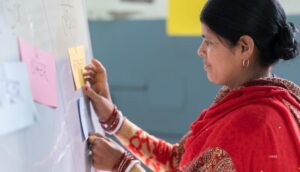With the Sustainable Development Goals (SDGs) having significantly raised the bar regarding ambition and universality, there is agreement that we have to go well beyond business as usual. Achieving breakthrough progress in these rapidly-changing times requires a new mind-set and different behavior from all of us.
“The greatest danger in times of turbulence is not the turbulence; it is to act with yesterday’s logic”, said Management Educator, Peter Drucker. Are we ready to step up our logic? What role can each of us play to realize the future we want?
As a neutral broker, UNDP increasingly takes innovative approaches to coordinating, connecting and co-creating with partners, globally and locally.
Coordination in a Confusing World
We live in transformational times with dynamics reinforced by globalization and technological progress causing threats and opportunities on an unprecedented scale.
Within this context, multilateral processes are of critical importance for dialogue and coordination to overcome fragmentation and duplication.
As UN Secretary-General António Guterres has stated, “coordination [is] a permanent must: a results-focused, people-centered and delivery-oriented coordination”.
With offices in some 170 countries, UNDP ‘connects the dots’ between actions and actors in both dimensions, horizontal and vertical.
Horizontally, UNDP brings together governments, business, civil society and development partners to exchange on development challenges and opportunities, such as during last year’s UNDP’s 50th Anniversary Ministerial Meeting. Leaders from around the world reflected on UNDP’s role and called upon it to be the ‘SDG accelerator’.
Vertically, UNDP connects national and regional development initiatives such as the African Union’s Agenda 2063 with the global SDGs to ensure collaboration and mutually supportive action.
Co-Creating Partnerships and Transformational Development
Increasingly, UNDP engages multiple stakeholders in an innovative approach of co-creation in programme design and implementation. Transformational development means that stakeholders dialogue, innovate and explore break-through solutions and partnerships together.
While governments have an important role in setting up frameworks, key power lies also with other stakeholders including businesses and civil society. First and foremost, people are the change agents of their own lives which means that developmental assistance ideally has the role of help for self-help.
An example of such co-creation are recent partner roundtables and people-centered programmes by UNDP’s Regional Service Centre for Africa in Addis Ababa, Ethiopia. The centre supports Africa’s continental development agenda through its regional programme and facilitates local and national development efforts through 45 Country Offices in sub-Saharan Africa. Several inclusive partner roundtables and stakeholder consultations discussed key development issues and co-created new strategic initiatives.
For instance, the Preventing Violent Extremism initiative aims at addressing root causes of youth becoming violent extremists, by in-depth consultations with youth, scholars, imams and people working on the ground on these issues. The initiative so far has attracted support of the governments of the Netherlands, Japan, Sweden and the United Kingdom. As one roundtable participant expressed the collaborative spirit “no one can do this alone”, a statement equally true to achieve the SDGs.
People-Centered Development
“Development should be people-centered. Development of the people, for the people and by the people” notes Selim Jahan, Director of UNDP’s Human Development Report Office.
Innovative development approaches recognizing people as change agents hold great promise to co-create better theories of change and development solutions. More research is needed to expand our current human development paradigm while deepening insights about root causes of transformational development.
Editor’s Note:
This article was adjusted from UNDP Africa Blog and is reproduced with permission.










